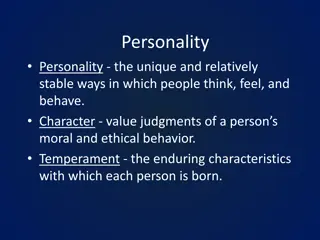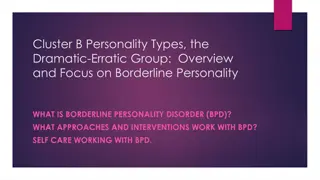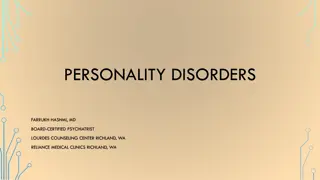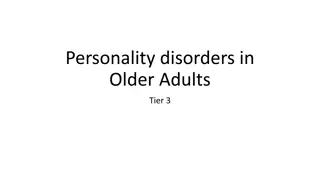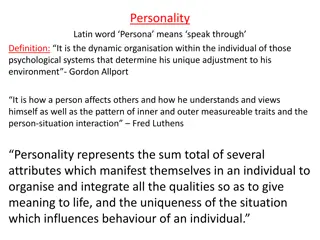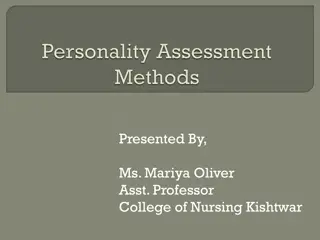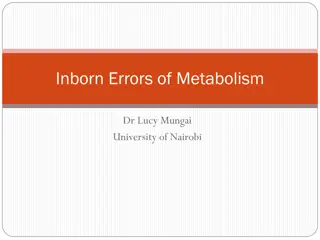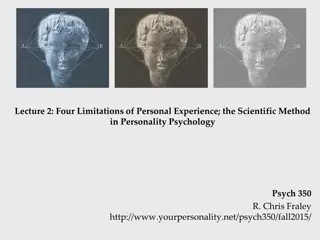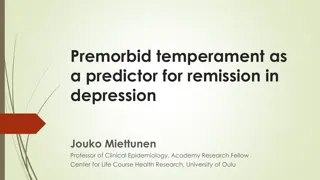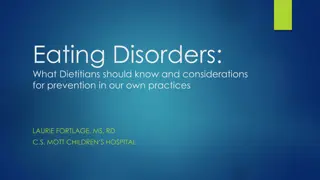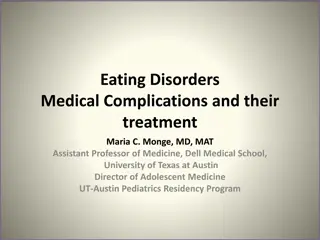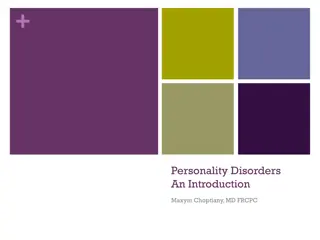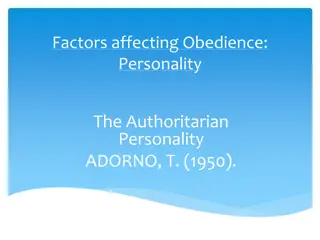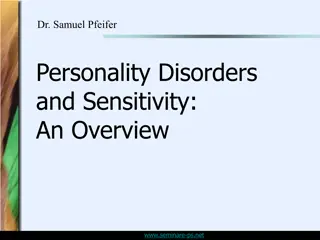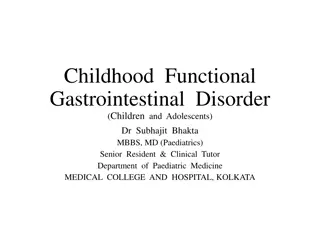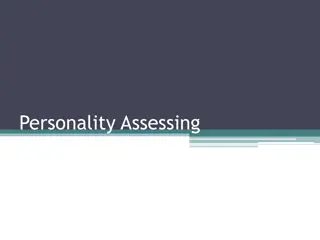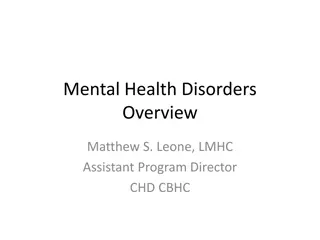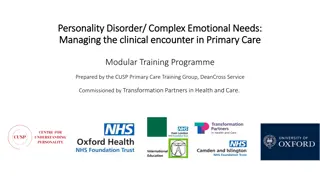Overview of Human Genetic Disorders
Human genetic disorders encompass a range of conditions, from recessive disorders like cystic fibrosis to dominant disorders such as Huntington's disease. Examples include cystic fibrosis, Huntington's disease, and sickle-cell anemia. Understanding genetic disorders involves research and awareness o
0 views • 10 slides
Understanding Personality: Freud's Psychoanalytic Theory
Personality encompasses unique ways individuals think, feel, and behave. Sigmund Freud's psychoanalytic theory explores the divisions of consciousness, parts of personality (Id, Ego, Superego), and stages of personality development. Freud's theory delves into the role of unconscious thoughts, desire
3 views • 41 slides
Understanding Personality: Theories and Components Explained
Personality is the unique and enduring characteristics that define individuals, influencing their behavior consistently over time. Explore the origins of personality from the Latin word 'persona' meaning 'mask', and delve into major perspectives such as psychoanalytic, trait, humanistic, and social-
1 views • 45 slides
Understanding Personality, Self-Esteem, and Emotions in Mental Health
Exploring the dynamics of personality traits such as extroversion, agreeableness, conscientiousness, emotional stability, and openness to experiences, this content delves into the key aspects of personality, self-esteem, and emotions. It discusses the differences between introverts and extroverts, o
0 views • 12 slides
Overview of Anxiety and Related Disorders
Anxiety disorders, such as PTSD, panic disorders, phobias, agoraphobia, and OCD, are characterized by varying degrees of fear and distress. Anxiety is a normal response to danger, but when it becomes chronic, it can lead to debilitating conditions. PTSD occurs post-trauma, panic disorders involve in
1 views • 42 slides
Understanding Borderline Personality Disorder (BPD) and Cluster B Personality Types
Borderline Personality Disorder (BPD) is part of the Cluster B Personality Types characterized by emotional instability, impulsivity, and strained relationships. Approaches for BPD include dialectical behavior therapy (DBT) and cognitive-behavioral therapy (CBT), while interventions involve emotion
1 views • 24 slides
Understanding Personality Disorders with Dr. Farrukh Hashmi, MD
Dr. Farrukh Hashmi, a board-certified psychiatrist at Lourdes Counseling Center and Reliance Medical Clinics in Richland, WA, specializes in personality disorders. He has no financial relationships with ineligible companies. Gain expert insight and guidance on addressing personality disorders from a
5 views • 35 slides
Understanding Personality Disorders in Older Adults
Personality disorders in older adults can present challenges in social functioning and relationships. Diagnosis involves assessing difficulties in maintaining relationships, controlling behavior, and listening to others. Recent personality changes may not always be due to a personality disorder but
0 views • 14 slides
Understanding Personality Disorders: A Comprehensive Overview and Classification
Dive into the world of personality disorders with this informative presentation by Professor Al-Sughayir. Explore the definition of personality, various types of disorders, traits, terminologies, and etiology. Gain insights into normal versus abnormal traits, functional impairments, and the role of
1 views • 25 slides
Understanding Somatic Symptom Disorders, Conversion Disorders, and Dissociative Disorders
Somatic symptom disorders manifest as physical symptoms without apparent cause, while conversion disorders involve specific physical symptoms incompatible with medical conditions. Illness anxiety disorder involves interpreting normal sensations as disease symptoms. Dissociative disorders lead to a s
1 views • 41 slides
Understanding Personality Disorders in Older Adults
Personality disorders in older adults refer to pervasive disturbances in personality and behavior that impact social functioning. Prevalence is around 10% in older community populations, with three main types of disorders categorized by emotional traits. Recent personality changes may indicate under
0 views • 12 slides
Understanding Personality: The Dynamic Organization Within Individuals
Personality, derived from the Latin word "Persona," encompasses the psychological systems shaping an individual's unique adjustment to the environment. It influences how a person interacts with others, perceives themselves, and displays a pattern of inner and outer traits. Personality integrates var
2 views • 10 slides
Understanding Personality Disorders in Older Adults
Personality disorders in older adults can present challenges in living with themselves and others, affecting social functioning and relationships. Prevalence estimates suggest around 10% in older community populations, with males more commonly affected. Different types of personality disorders exist
1 views • 12 slides
Understanding Personality Assessments in Interviews
Personality assessments in interviews are valuable tools for evaluating a candidate's characteristics, abilities, and aspirations. Various types of assessments, such as structured and unstructured interviews, personality inventories like the Minnesota Multiphasic Personality Inventory, the Big Five
1 views • 28 slides
Understanding Personality Traits and Assessments
Psychologists utilize traits to describe personality, addressing common misunderstandings about introversion and exploring the strengths and weaknesses of personality inventories. The consistency of personality traits over time and across situations is examined, along with the identification of insi
0 views • 38 slides
Understanding Personality and Its Impact on Career Choices
Explore personality traits, reflect on past experiences, engage in classroom discussions, and take part in online assessments to understand the intricacies of personality and how it influences career decisions. Unveil the key term "Personality" through activities and discussions aimed at self-awaren
1 views • 12 slides
Understanding Inborn Errors of Metabolism and Metabolic Disorders
Inborn Errors of Metabolism (IEM) are genetic disorders that disrupt metabolic pathways, leading to substrate accumulation or product deficiency. These disorders can be classified based on toxic accumulation, protein metabolism, carbohydrate intolerance, lysosomal storage issues, energy production d
0 views • 29 slides
Understanding Co-occurring Mental and Physical Health Conditions
Co-occurring mental and physical health disorders are prevalent and require an integrative multidisciplinary approach for effective assessment and treatment. This holistic approach helps address the complexity of managing multiple disorders in an integrated healthcare setting. Through a multi-direct
1 views • 37 slides
Understanding Functional GI Disorders: A Comprehensive Overview
Functional GI disorders encompass a range of conditions affecting the gastrointestinal system, such as irritable bowel syndrome and disorders of the gut-brain interaction. These disorders are characterized by no structural abnormalities but are influenced by factors like motility disturbance, viscer
0 views • 42 slides
Understanding Genetic Disorders and Their Impact on Health
Genetic disorders are caused by abnormalities in genes or chromosomes, leading to various health conditions. Inherited disorders can be passed down from parents to children, affecting physical makeup and processes in the body. In India, there is a high prevalence of genetic disorders, particularly i
1 views • 12 slides
The Importance of the Scientific Method in Personality Psychology
Understanding personality requires moving beyond personal experiences and subjective beliefs. This lecture emphasizes the limitations of personal experience and the necessity of the scientific method in studying personality. By examining the methods and themes of psychology, we uncover the fundament
0 views • 60 slides
Premorbid Temperament as a Predictor for Remission in Depression Study
Personality traits, specifically premorbid temperament, play a crucial role in predicting remission from depressive disorders. This study, led by Professor Jouko Miettunen, examines how premorbid personality can be a significant factor in assessing the risk and outcome of depressive disorders. By an
0 views • 11 slides
Understanding Eating Disorders: Types, Signs, Effects, and Recovery
Eating disorders are mental disorders characterized by unhealthy eating habits and can have severe physical and psychological consequences. This article explores the definition of eating disorders, signs to look out for, different types such as Anorexia Nervosa, Bulimia Nervosa, Pica, and Purging Di
0 views • 10 slides
Understanding Eating Disorders: Insights for Dietitians
Eating disorders are complex neurobiological conditions that are not merely about control or weight management. These disorders can affect individuals of all genders, body sizes, and socioeconomic backgrounds. Dietitians play a crucial role in identifying, assessing, and treating eating disorders, a
0 views • 41 slides
Understanding Eating Disorders: Medical Complications and Treatment
This presentation by Dr. Maria C. Monge covers the common eating disorders in teenage patients, potential medical complications, and the role of the medical team in treatment. It includes definitions of disorders like Anorexia Nervosa, Bulimia Nervosa, and Binge Eating Disorder according to DSM-5 cr
0 views • 60 slides
Exploring Personality Types and Traits - IPE.MDY.ZONE.2020
Personality types and traits play a significant role in shaping an individual's behavior, thinking patterns, and relationships. This content delves into the primary personality types - Dominance, Inducement, Compliance, and Steadiness - highlighting their characteristics and the Type A and Type B pe
0 views • 28 slides
The Influence of Personality on Presidential Leadership Style: A Case Study of Donald J. Trump
This study examines how personality traits influence presidential leadership styles, focusing on a case study of Donald J. Trump, the 45th President of the United States. It explores the conceptual links between Trump's personality profile and models of political leadership. The research includes a
2 views • 24 slides
Understanding Brand Personality: A Key Element in Customer Attraction
Every brand, like every individual, has a unique personality that plays a vital role in attracting customers. Defining and embodying this personality is crucial for building customer loyalty and standing out in the market. This tutorial explores the importance of brand personality, guides you in ide
0 views • 5 slides
Understanding Sleep Disorders: Classification and Diagnosis
Sleep disorders encompass various conditions affecting sleep patterns and quality. They are classified into categories such as insomnia, sleep-related breathing disorders, central disorders of hypersomnolence, circadian rhythm sleep-wake disorders, parasomnias, and sleep-related movement disorders.
0 views • 32 slides
Understanding Personality Disorders: An Overview
Personality disorders are chronic and maladaptive patterns of thinking, feeling, and behaving that negatively impact interpersonal relationships. Those affected often do not recognize their behaviors as problematic. Differentiating between personality disorders and traits is crucial for diagnosis an
0 views • 97 slides
Understanding Authoritarian Personality and Obedience Factors
Factors influencing obedience, like the Authoritarian Personality theory by Adorno, suggest that early childhood experiences, especially harsh upbringing, can lead to rigid beliefs, high obedience to authority, and discrimination towards perceived lower-status groups. Adorno's research utilized ques
0 views • 6 slides
Understanding Healthy Personality Development
Exploring the concept of a healthy personality and its significance in personal well-being and societal adaptation. The discussion covers different models of mental health, the purpose of personality, and the eight modalities of personal functioning that contribute to overall psychological well-bein
0 views • 32 slides
Overview of Classification of Psychiatric Disorders
Psychiatric disorders are illnesses with various manifestations that impact functioning due to disturbances in biological, social, genetic, and other factors. Two key classification systems, ICD-10 and DSM-5, categorize over 200 types of psychiatric illnesses. The ICD-10 includes categories like org
0 views • 18 slides
Understanding Childhood Functional Gastrointestinal Disorders
Functional Gastrointestinal Disorders (FGIDs) in children and adolescents are characterized by chronic or recurring symptoms that cannot be fully explained by current structural or biochemical tests. These disorders emphasize the role of normal development in symptom presentation and the lack of evi
0 views • 46 slides
Understanding Personality Assessment Techniques
Personality assessment techniques include Eysenck's Personality Questionnaire, the Big Five traits theory, psychoanalysis, methods to access the unconscious mind, objective personality tests' advantages and disadvantages, and self-report inventories like the MMPI. Be cautious of the Barnum Effect in
0 views • 18 slides
Understanding Personality: Theories and Perspectives
Personality is a dynamic psychological concept shaped by internal needs, cognitive processes, and external influences. Psychodynamic and humanistic theories offer insights into different aspects of personality, while clinical and social-cognitive perspectives contribute to our understanding. Freud's
0 views • 26 slides
Understanding Mental Health Disorders and Their Impact
Mental health disorders are prevalent, affecting 1 in 5 adults in the U.S. each year. They can significantly impair various aspects of life and lead to severe consequences, including high costs, hospitalizations, homelessness, and incarceration. Factors contributing to mental illness vary from biolo
0 views • 54 slides
Understanding Personality Disorders and Complex Emotional Needs in Primary Care
This training program focuses on managing clinical encounters related to personality disorders and complex emotional needs in primary care settings. Modules cover developmental factors, building trusting relationships, and the biopsychosocial model's impact on attachment, trauma, and mentalizing. At
0 views • 9 slides
Overview of Psychiatric Pharmacology: A Comprehensive Guide from 2013
This presentation delves into the nuances of psychiatric pharmacology, exploring common psychiatric conditions, historical perspectives on medical treatments, categories of psychiatric medications, and principles of treatment. It also touches on mental illness definitions from DSM-IV-TR and DSM-V, a
0 views • 27 slides
Understanding Personality and Self-Esteem: Exploring Traits and Mental Health
Exploring personality traits, self-esteem, and mental health through definitions, group activities, and descriptions of extroverts, introverts, optimists, pessimists, and realists. The content covers creating lists of personality traits, identifying assertive behaviors, and outlining objectives rela
0 views • 68 slides

